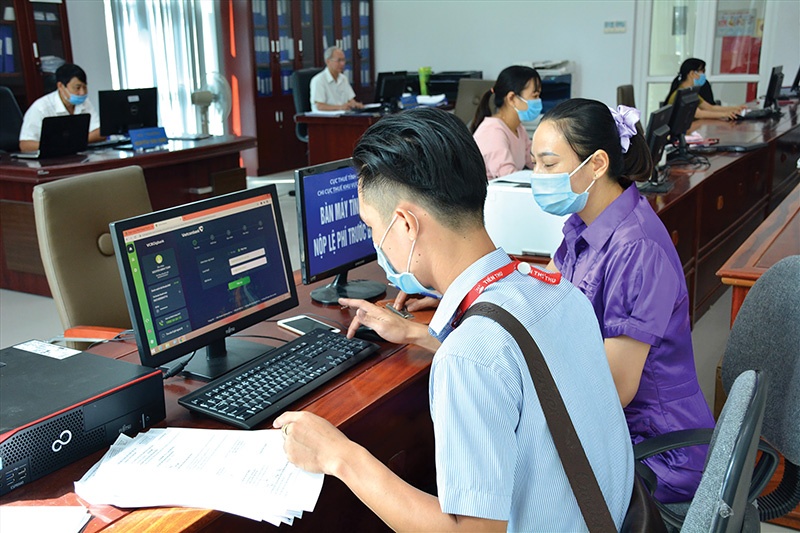“Exhausted” businesses out of reach of support
 |
| While SMEs are exhausted, banks refrain from providing loans to them. Photo: Le Toan |
Although Ho Chi Minh City and other cities and provinces nationwide have relaxed lockdown rules for over a week, numerous businesses have decided not to resume operations at all.
Do Van Thanh, owner of a mechanical factory in the city’s Go Vap district, told VIR that the financial struggles are simply too deep to try again.
“After halting operations for such a long time, small- and medium-sized enterprises (SMEs) like us are exhausted. Without generating any revenues, we have spent around $300,000-500,000 for employee salaries, loan interest, and rent,” Thanh explained, adding that he does not have enough money to re-invest and produce in addition to the many burdens surrounding materials, partners, transport, and COVID-19 tests. “So, I intend to halt all activities and submit dissolution procedures. Without favourable policies and support, doing business amid COVID-19 is too risky.”
Thanh’s case is not the only one, as thousands of businesses across the country are struggling to restart operations. In the first nine months of the year, over 90,000 businesses left the market or were waiting for their dissolution procedures, an increase of 15.3 per cent on-year, according to the Ministry of Planning and Investment (MPI).
In September, the number of both newly-registered businesses and registered capital dropped significantly on-year. Only about 3,900 businesses were registered, down 62.2 per cent on-year, and 32.3 per cent on-month, the smallest number of new registrations in a decade. The average newly-registered capital was $2.7 million, a decrease of 69.3 per cent on-year, and 8.1 per cent on-month, which is also the lowest in the first nine months since 2016.
According to a survey from the Private Economic Development Research Department under the prime minister’s Administrative Procedure Reform Advisory Council, 69 per cent of 21,500 surveyed enterprises confirmed to cease their operation amid the pandemic, and only 16 per cent of them have remained operational under full capacity. These firms desire preferential loans, vaccines for labourers, and assurance of goods circulation to generate revenues and working capital for production and investment.
At the early-October’s meeting of the National Assembly Standing Committee, National Assembly Chairman Vuong Dinh Hue asked the State Bank of Vietnam and the Ministry of Finance to propose a bailout of direct interest rates financed by the state budget for businesses that are struggling, with value of around $87-174 million, together with a credit bailout of $2.6-4.35 million.
In a recent letter sent to the prime minister, Do Xuan Lap, chairman of the Vietnam Timber and Forest Products Association, said that although commercial banks announced to lower the annual interest rate by 0.3-1.5 per cent, along with other credit packages, this would be unremarkable compared to the losses they are suffering.
To Hoai Nam, vice chairman of the Vietnam Association of Small and Medium Enterprises said that a huge number of businesses are too exhausted to maintain operations. If the state can reach the credit bailout with an affordable interest rate, they can easily mobilise some money. “This should be built in combination with loosened borrowing conditions for businesses,” proposed Nam.
Another challenge comes from the scale of enterprises, 97 per cent of which are SMEs with modest financial capacity, and few assets to offer as guarantee. Nam said that within the regulations, businesses can access capital in the form of unsecured loans. However, in fact, banks are very reluctant to lend to them.
Can Van Luc, a member of the National Fiscal and Monetary Policy Advisory Council, said that supporting interest rates with the state budget and other borrowing conditions need the support of relevant ministries and agencies.
While SMEs are facing many difficulties and are exhausted without any promising projects, it remains risky for banks to provide loans to them. According to the Law on Credit Institutions, banks are not allowed to lend money to loss-making enterprises, and the Law on Public Debt Management stipulates that the government cannot guarantee enterprise loans.
“How can SMEs borrow money from banks? We should revive credit guarantee funds to support SMEs,” Luc said. “There are 28 funds in the country, but their performance is sub-optimal. They should be ready to guarantee SMEs like in other countries. This would help SMEs access capital, in addition to other solutions of the government.”
What the stars mean:
★ Poor ★ ★ Promising ★★★ Good ★★★★ Very good ★★★★★ Exceptional
Related Contents
Latest News
More News
- Japanese business outlook in Vietnam turns more optimistic (January 28, 2026 | 09:54)
- Foreign leaders extend congratulations to Party General Secretary To Lam (January 25, 2026 | 10:01)
- 14th National Party Congress wraps up with success (January 25, 2026 | 09:49)
- Congratulations from VFF Central Committee's int’l partners to 14th National Party Congress (January 25, 2026 | 09:46)
- 14th Party Central Committee unanimously elects To Lam as General Secretary (January 23, 2026 | 16:22)
- Worldwide congratulations underscore confidence in Vietnam’s 14th Party Congress (January 23, 2026 | 09:02)
- Political parties, organisations, int’l friends send congratulations to 14th National Party Congress (January 22, 2026 | 09:33)
- Press release on second working day of 14th National Party Congress (January 22, 2026 | 09:19)
- 14th National Party Congress: Japanese media highlight Vietnam’s growth targets (January 21, 2026 | 09:46)
- 14th National Party Congress: Driving force for Vietnam to continue renewal, innovation, breakthroughs (January 21, 2026 | 09:42)

 Tag:
Tag:




















 Mobile Version
Mobile Version